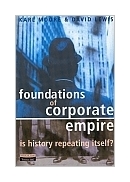|
||
• wydawnictwa polskie
• Zamów informacje o nowościach z wybranego tematu • kontakt
• Cookies na stronie |
FOUNDATION OF CORPORATE EMPIREMOORE K., LEWIS D.wydawnictwo: FT/PH , rok wydania 2000, wydanie Icena netto: Foundations of Corporate Empire: Is History Repeating Itself, 1/e Karl Moore, Oxford University
David Lewis holds a Ph.D. in history from the University of Toronto and an MA in history from the University of Western Ontario. His research interests include the development of the idea of a United Europe in the 20th century and ancient Near Eastern history and archaeology. He has taught at the University of Toronto, the University of Windsor, and Trent University. His research has been published in a number of journals including Florilegium, Management International Review, and Business History. At the dawn of a new economic age the future belongs to a cast of giant transnational companies along with networked newer players. Is this a new economic phenomenon? Or the latest movement in the evolution of economic prototypes thousands of years old? From the cradles of civilization to the corporations of global economy, business empires have come and gone, but the essence of economic enterprise has always been with us. This is a world in which enterprises have been shaped as much by what they are as what they do, and in which an understanding of where we've come from will aid our interpretation of where we can go. Every future has a foundation to be explored. Foundations of Corporate Empire sketches the history of international business from the emergence of ancient Assyria around 2000 BC through the Phoenician, Carthaginian, and Grecian periods up to the time of the Roman Imperium under Augustus, and then on to the medieval and modern eras ending with today's post-modern times. The history of these civilizations has developed around different economic models, which have regularly re-emerged across time and are still present today. Foundations of Corporate Empire looks at our past economic foundations to better understand where we are today and where we should be tomorrow.
Professor D'Aveni, author of Hypercompetition: Managing the Dynamics of Strategic Maneuvering
Professor Alister McGrath, Oxford University
Richard T. Pascale, associate fellow, Templeton College, University of Oxford
Cornelis A. de Kluyver, Dean, Peter F. Drucker Graduate School of Management
Sir David Rowland, President, Templeton College, University of Oxford The Foundations of Corporate Empire is a grand, sweeping look across the historical vista of the development and rise of the multinational corporation. It is a powerful demonstration of the impact and ubiquity of what we know as "the corporation" -- and its extraordinary impact on global business. The authors analyze the development of the global economy through the lens of the multinational corporation from 2000 B.C. to 2000 A.D. -- and, drawing on an extraordinary understanding of today's key trends, preview tomorrow's leading global enterprises.KEY TOPICS:We often think about the multinational or transnational corporation as a quintessentially 20th century phenomenon: The Ford Motor Company of the 1920s, or today's General Electric and ABB. But multinationals have existed for thousands of years. The Hudson Bay Company and East India Company were the multinationals of their day; before them came the corporate empires of the Italian mercantilists, the Chinese, the Aegean entrepreneurs, even the Phoenician corporate state. This book presents them all, in their glories -- and also includes a detailed look at how today's U.S. and Japanese corporate behemoths evolved. Along the way, the authors illuminate every key aspect of multinational enterprise: hierarchical organization, foreign employees, common stock ownership, resource and market seeking behavior, and techniques for successfully coordinating wide-ranging business empires from corporate headquarters.MARKET:For everyone seeking perspective on today's global enterprises, including senior executives, senior managers, consultants, and MBA faculty and students. 318 pages
Po otrzymaniu zamówienia poinformujemy, |


